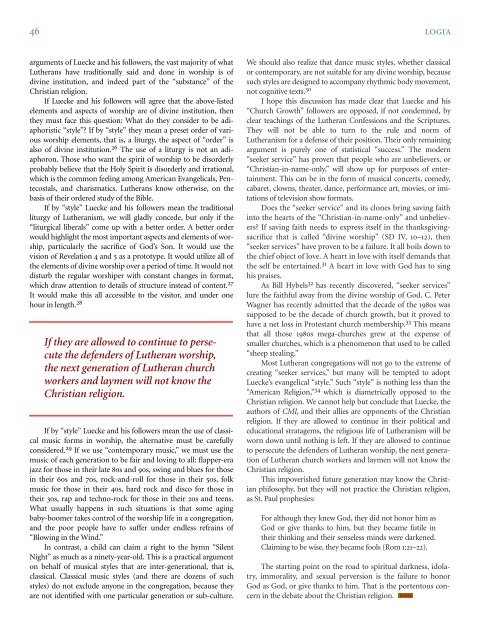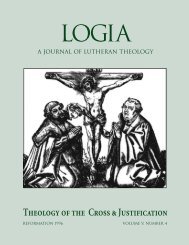04-2 Hermeneutics.pdf
04-2 Hermeneutics.pdf
04-2 Hermeneutics.pdf
- No tags were found...
Create successful ePaper yourself
Turn your PDF publications into a flip-book with our unique Google optimized e-Paper software.
46 LOGIAarguments of Luecke and his followers, the vast majority of whatLutherans have traditionally said and done in worship is ofdivine institution, and indeed part of the “substance” of theChristian religion.If Luecke and his followers will agree that the above-listedelements and aspects of worship are of divine institution, thenthey must face this question: What do they consider to be adiaphoristic“style”? If by “style” they mean a preset order of variousworship elements, that is, a liturgy, the aspect of “order” isalso of divine institution. 26 The use of a liturgy is not an adiaphoron.Those who want the spirit of worship to be disorderlyprobably believe that the Holy Spirit is disorderly and irrational,which is the common feeling among American Evangelicals, Pentecostals,and charismatics. Lutherans know otherwise, on thebasis of their ordered study of the Bible.If by “style” Luecke and his followers mean the traditionalliturgy of Lutheranism, we will gladly concede, but only if the“liturgical liberals” come up with a better order. A better orderwould highlight the most important aspects and elements of worship,particularly the sacrifice of God’s Son. It would use thevision of Revelation 4 and 5 as a prototype. It would utilize all ofthe elements of divine worship over a period of time. It would notdisturb the regular worshiper with constant changes in format,which draw attention to details of structure instead of content. 27It would make this all accessible to the visitor, and under onehour in length. 28If they are allowed to continue to persecutethe defenders of Lutheran worship,the next generation of Lutheran churchworkers and laymen will not know theChristian religion.nbIf by “style” Luecke and his followers mean the use of classicalmusic forms in worship, the alternative must be carefullyconsidered. 29 If we use “contemporary music,” we must use themusic of each generation to be fair and loving to all: flapper-erajazz for those in their late 80s and 90s, swing and blues for thosein their 60s and 70s, rock-and-roll for those in their 50s, folkmusic for those in their 40s, hard rock and disco for those intheir 30s, rap and techno-rock for those in their 20s and teens.What usually happens in such situations is that some agingbaby-boomer takes control of the worship life in a congregation,and the poor people have to suffer under endless refrains of“Blowing in the Wind.”In contrast, a child can claim a right to the hymn “SilentNight” as much as a ninety-year-old. This is a practical argumenton behalf of musical styles that are inter-generational, that is,classical. Classical music styles (and there are dozens of suchstyles) do not exclude anyone in the congregation, because theyare not identified with one particular generation or sub-culture.We should also realize that dance music styles, whether classicalor contemporary, are not suitable for any divine worship, becausesuch styles are designed to accompany rhythmic body movement,not cognitive texts. 30I hope this discussion has made clear that Luecke and his“Church Growth” followers are opposed, if not condemned, byclear teachings of the Lutheran Confessions and the Scriptures.They will not be able to turn to the rule and norm ofLutheranism for a defense of their position. Their only remainingargument is purely one of statistical “success.” The modern“seeker service” has proven that people who are unbelievers, or“Christian-in-name-only,” will show up for purposes of entertainment.This can be in the form of musical concerts, comedy,cabaret, clowns, theater, dance, performance art, movies, or imitationsof television show formats.Does the “seeker service” and its clones bring saving faithinto the hearts of the “Christian-in-name-only” and unbelievers?If saving faith needs to express itself in the thanksgivingsacrificethat is called “divine worship” (SD IV, 10–12), then“seeker services” have proven to be a failure. It all boils down tothe chief object of love. A heart in love with itself demands thatthe self be entertained. 31 A heart in love with God has to singhis praises.As Bill Hybels 32 has recently discovered, “seeker services”lure the faithful away from the divine worship of God. C. PeterWagner has recently admitted that the decade of the 1980s wassupposed to be the decade of church growth, but it proved tohave a net loss in Protestant church membership. 33 This meansthat all those 1980s mega-churches grew at the expense ofsmaller churches, which is a phenomenon that used to be called“sheep stealing.”Most Lutheran congregations will not go to the extreme ofcreating “seeker services,” but many will be tempted to adoptLuecke’s evangelical “style.” Such “style” is nothing less than the“American Religion,” 34 which is diametrically opposed to theChristian religion. We cannot help but conclude that Luecke, theauthors of CMI, and their allies are opponents of the Christianreligion. If they are allowed to continue in their political andeducational stratagems, the religious life of Lutheranism will beworn down until nothing is left. If they are allowed to continueto persecute the defenders of Lutheran worship, the next generationof Lutheran church workers and laymen will not know theChristian religion.This impoverished future generation may know the Christianphilosophy, but they will not practice the Christian religion,as St. Paul prophesies:For although they knew God, they did not honor him asGod or give thanks to him, but they became futile intheir thinking and their senseless minds were darkened.Claiming to be wise, they became fools (Rom 1:21–22).The starting point on the road to spiritual darkness, idolatry,immorality, and sexual perversion is the failure to honorGod as God, or give thanks to him. That is the portentous concernin the debate about the Christian religion. LOGIA
















